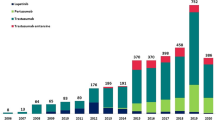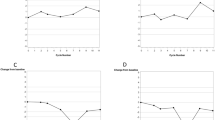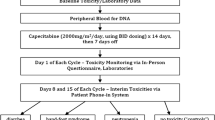Abstract
Purpose
Asthenia, myalgia, arthralgia, mucositis, abdominal pain, diarrhea, and neutropenia are adverse reactions commonly reported by women undergoing chemotherapy. Traditional approaches do not take into account the effect that chemotherapeutic changes and variable interactions can cause in adverse reactions. We aimed to identify the impact of the change of a chemotherapy protocol within the same treatment in profiles associated with adverse reactions.
Methods
A total of 166 women admitted to the Brazilian National Institute of Cancer (INCA) were followed. Polymorphisms, clinical variables, and FAC-D protocols (3 cycles of cyclophosphamide, 5-fluorouracil, and doxorubicin followed by 3 cycles of docetaxel) composed the set of independent variables analyzed. Reaction levels were recorded at the end of each chemotherapy cycle via interviews. Marginal models were fitted.
Results
The results of marginal models for non-hematological reactions revealed that the docetaxel phase was associated with increased reaction levels compared with the FAC phase. In addition, the set of factors associated with the reactions changed in each protocol. The post-menopausal status was related to high levels of asthenia in docetaxel protocol whereas CYP2B6 polymorphism (rs3745274) was related to high levels in FAC protocol. Regarding the docetaxel phase, high levels of abdominal pain and mucositis were related to CBR3 gene (rs8133052) polymorphism and diabetes respectively.
Conclusion
The results suggest the need for monitoring non-hematological reactions during the docetaxel phase of FAC-D treatment. The factors related to more severe reactions depend on the chemotherapy protocol used.

Similar content being viewed by others
References
De Laurentiis M, Cancello G, D'Agostino D, Giuliano M, Giordano A, Montagna E et al (2008) Taxane-based combinations as adjuvant chemotherapy of early breast cancer: a meta-analysis of randomized trials. J Clin Oncol 26(1):44–53. https://doi.org/10.1200/JCO.2007.11.3787
Hassan MSU, Ansari J, Spooner D, Hussain SA (2010) Chemotherapy for breast cancer (review). Oncol Rep 24:1121–1231. https://doi.org/10.3892/or-00000963
Solimando DA (2003). Drug information handbook for oncology: featuring a complete guide to combination chemotherapy regimens. Lexi-comp
Chu E, DeVita VT Jr (2017). Physicians' Cancer Chemotherapy Drug Manual 2018. Jones & Bartlett Learning
Davies EC, Green CF, Mottram DR, Pirmohamed M (2007) Adverse drug reactions in hospitals: a narrative review. Curr Drug Saf 2(1):79–87. https://doi.org/10.2174/157488607779315507
Wooten JM (2010) Adverse drug reactions: part I. South Med J 103(10):1025–1028. https://doi.org/10.1097/SMJ.0b013e3181f0c866
Menon SZ, Lima AC, Chorilli M, Franco YO (2005) Reações adversas a medicamentos (RAMs). Saúde Rev 7(16):71–79
Larini L (2009). Fármacos e medicamentos. Artmed Editora
Nagao-Dias AT, Barros-Nunes P, Coelho HL, Solé D (2004) Reações alérgicas a medicamentos. J Pediatr 80(4):259–266. https://doi.org/10.2223/1198
De-Jong N, Courtens AM, Abu-Saad HH et al (2002) Fatigue in patients with breast cancer receiving adjuvant chemotherapy: a review of the literature. Cancer Nurs 25:283–297. https://doi.org/10.1097/00002820-200208000-00004
Andrykowski MA, Donovan KA, Laronga C, Jacobsen PB (2010) Prevalence, predictors, and characteristics of off-treatment fatigue in breast cancer survivors. Cancer 116(24):5740–5748. https://doi.org/10.1002/cncr.25294
Donovan KA, Small BJ, Andrykowski MA, Munster P, Jacobsen PB (2007) Utility of a cognitive-behavioral model to predict fatigue following breast cancer treatment. Health Psychol 26(4):464–472. https://doi.org/10.1037/0278-6133.26.4.464
Castel LD, Hartmann KE, Mayer IA, Saville BR, Alvarez J, Boomershine CS, Abramson VG, Chakravarthy AB, Friedman DL, Cella DF (2013) Time course of arthralgia among women initiating aromatase inhibitor therapy and a postmenopausal comparison group in a prospective cohort. Cancer 119(13):2375–2382. https://doi.org/10.1002/cncr.28016
Lyman GH (2006) Risks and consequences of chemotherapy-induced neutropenia. Clin Cornerstone 8:S12–S18. https://doi.org/10.1016/S1098-3597(06)80054-2
Stein BN, Petrelli NJ, Douglass HO, Driscoll DL, Arcangeli G, Meropol NJ (1995) Age and sex are independent predictors of 5fluorouracil toxicity. Analysis of a large scale phase I trial. Cancer 75:11–17. https://doi.org/10.1002/1097-0142(19950101)75:1<11::AID-CNCR2820750104>3.0.CO;2-N
McCarthy GM, Awde JD, Ghandi H, Vincent M, Kocha WI (1998) Risk factors associated with mucositis in cancer patients receiving 5-fluorouracil. Oral Oncol 34(6):484–490. https://doi.org/10.1016/S1368-8375(98)00068-2
Zhang BL, Tong S, Zhang BN, Zheng S, Ning LÜ, Xu BH et al (2011) Polymorphisms ofgstp1is associated with differences of chemotherapy response and toxicity in breast cancer. Chin Med J 124(2):199–204. https://doi.org/10.3760/cma.j.issn.0366-6999.2011.02.008
Tsai SM, Lin CY, Wu SH, Hou LA, Ma H, Tsai LY, Hou MF (2009) Side effects after docetaxel treatment in Taiwanese breast cancer patients with CYP3A4, CYP3A5, and ABCB1 gene polymorphisms. Clin Chim Acta 404:160–165. https://doi.org/10.1016/j.cca.2009.03.038
RochaV PR, Fernandes JF, Filion A, Bittencourt H, Silva W Jr et al (2009) Association of drug metabolism gene polymorphisms with toxicities, graft-versus-host disease and survival after HLA-identical sibling hematopoietic stem cell transplantation for patients with leukemia. Leukemia 23(3):545–556. https://doi.org/10.1038/leu.2008.323
Ikeda M, Tsuji D, Yamamoto K, Kim YI, Daimon T, Iwabe Y, Hatori M, Makuta R, Hayashi H, Inoue K, Nakamichi H, Shiokawa M, Itoh K (2015) Relationship between ABCB1 gene polymorphisms and severe neutropenia in patients with breast cancer treated with doxorubicin/cyclophosphamide chemotherapy. Drug Metab Pharmacokinet 30(2):149–153. https://doi.org/10.1016/j.dmpk.2014.09.009
Aguiar ES, Giacomazzi JS, Aishameriane V, Bock H, Saraiva ML, Schuler L, Duarte D, Santos P, Almeida GR, Cale M, Camey SA, Ashton PP (2012) GSTM1, GSTT1, and GSTP1 polymorphisms, breast cancer risk factors and mammographic density in women submitted to breast cancer screening. Rev Bras Epidemiol 15(2):246–255. https://doi.org/10.1590/S1415-790X2012000200002
Linhares JJ, Da Silva G, Cotrim ID, Nogueira de Souza NC, Coelho Noronha E et al (2005) Genetic polymorphism of GSTM1 in women with breast cancer and interact with reproductive history and several clinical pathologies. Biol Res 38(2–3):273–281
Zeger SL, Liang KY, Albert PS (1988) Models for longitudinal data: a generalized estimating equation approach. Biometrics 44:1049–1060. https://doi.org/10.2307/2531734
Zeger SL, Liang KY (1986) Longitudinal data analysis for discrete and continuous outcomes. Biometrics 42:121–130. https://doi.org/10.2307/2531248
Chu E, DeVita VT Jr (2009) Physicians’ cancer chemotherapy drug manual 2018. Jones & Bartlett Learning. https://doi.org/10.3779/j.issn.1009-3419.2009.11.10
Saad ED, Hoff PM, Carnelós RP, Katz A, Novis YA, Pietrocola M et al (2002) Critérios comuns de toxicidade do Instituto Nacional de Câncer dos Estados Unidos. Rev Bras Cancerol 48(10):63–96
Trotti A, Colevas AD, Setser A, Rusch V, Jaques D, Budach V et al (2003) CTCAE v3. 0: development of a comprehensive grading system for the adverse effects of cancer treatment. Semin Radiat Oncol 13(3):176–181 WB Saunders
Diggle P, Diggle PJ, Heagerty P, Heagerty PJ, Liang KY, Zeger S (2002) Analysis of longitudinal data. Oxford University Press
Liang KY, Zeger SL (1986) Longitudinal data analysis using generalized linear models. Biometrika. 73:13–22. https://doi.org/10.1093/biomet/73.1.13
Hin LY, Wang YG (2009) Working-correlation-structure identification in generalized estimating equations. Stat Med 28(4):642–658. https://doi.org/10.1002/sim.3489
Lin KC (2010) Goodness-of-fit tests for modeling longitudinal ordinal data. Comput Stat Data Anal 54(7):1872–1880. https://doi.org/10.1016/j.csda.2010.02.013
Hainsworth JD (2004) Practical aspects of weekly docetaxel administration schedules. Oncologist 9(5):538–545. https://doi.org/10.1634/theoncologist.9-5-538
Burstein HJ. (2009). Personalized medicine and breast cancer care. Personalized Medicine and Breast Cancer Care
Seguin C, Kovacevich N, Voutsadakis IA (2017) Docetaxel-associated myalgia–arthralgia syndrome in patients with breast cancer. Breast Cancer: Targets Ther 9:39
De Jong N, Candel MJJM, Schouten HC, Huijer Abu-Saad H, Courtens AM (2005) Course of mental fatigue and motivation in breast cancer patients receiving adjuvant chemotherapy. Ann Oncol 16(3):372–382. https://doi.org/10.1093/annonc/mdi095
Agresti A, Kateri M (2011) Categorical data analysis. Springer, Berlin Heidelberg, pp 206–208
Acknowledgments
The authors thank the Instituto Nacional do Cancer (INCA), the Programa de Engenharia Biomédica (Universidade Federal do Rio de Janeiro), and all of the women who participated in this study.
Funding
This work was supported by the Conselho Nacional de Pesquisa e Desenvolvimento (CNPQ) and the Fundação Carlos Chagas Filho de Amparo à Pesquisa no Rio de Janeiro (FAPERJ).
Author information
Authors and Affiliations
Corresponding author
Ethics declarations
Conflict of interest
The authors declare that they have no conflict of interest.
Ethical approval
The INCA Ethics Research Committee approved the study protocol (number 129/08), and all subjects signed the informed consent form before inclusion in this study.
Additional information
Publisher’s note
Springer Nature remains neutral with regard to jurisdictional claims in published maps and institutional affiliations.
Rights and permissions
About this article
Cite this article
Paula, D.P., do Brasil Costa, V.I., Jorge, R.V. et al. Impact of protocol change on individual factors related to course of adverse reactions to chemotherapy for breast cancer. Support Care Cancer 28, 395–403 (2020). https://doi.org/10.1007/s00520-019-04841-x
Received:
Accepted:
Published:
Issue Date:
DOI: https://doi.org/10.1007/s00520-019-04841-x




